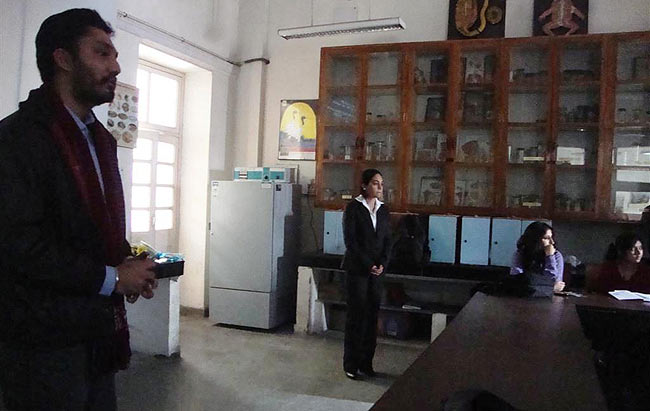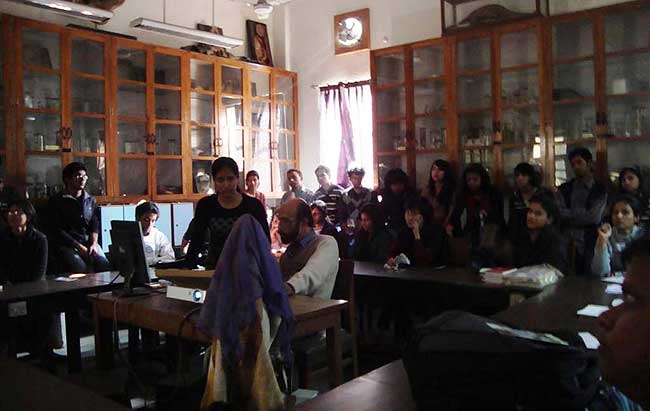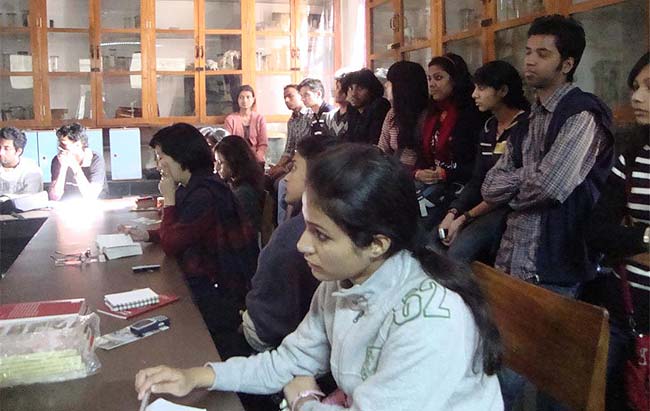. . . . . . . . . . . . . . . . . . . . . . . . . .
"Meltdown in Tibet: Film, Talk and Discussion"
(Hindu College, University of Delhi, December 16, 2010)

Govind Singh (Founder-Director of Delhi Greens) and Bhavna Singh during "Meltdown in Tibet" event organised by Friends of Tibet (Delhi), Indo-Tibet Coordination Office, India Tibet Friendship Society and Delhi Greens at the Hindu College, Delhi on December 16, 2010.
. . . . . . . . . . . . . . . . . . . . . . . . . .
Delhi: A 'Film Screening, Talk and Discussion' program was organised on December 16, 2010 at the Zoology Department of the Hindu College, University of Delhi with support and coordination from Friends of Tibet (Delhi), Indo-Tibet Coordination Office, India Tibet Friendship Society and Delhi Greens, an event that helped raise awareness on the Tibet region and emphasise upon its geo-political significance in the wake of climate change.
Rapid, anthropogenic, unplanned and short sighted activities in the Tibetan plateau — invariably the roof of the world — will have an immediate adverse impact on the Asian economy and environment. At the forefront of the impacts of this change is India, where rivers are religiously and culturally significant and also feed millions of its citizens. The program was therefore also structured to discuss the issues of damming of the Tibetan rivers and the consequent water scarcity in South Asia in the near future.
Bhavna Singh was then invited on the stage to deliver a presentation and shed light on the topic of Geopolitics of Tibet in India-China relations. Through a well thought of presentation, Bhavna Singh highlighted the extreme significance of Tibet in the geopolitical scenario of South Asia. Her presentation also reinforced that the recent happenings in Tibet, with regard to economics, environment, and culture are changes that are deep seated in the plateau and will directly impact the set up in India. The data and illustrations presented by Singh helped the audience appreciate the magnitude of the problem and understand the necessity for India and the global community, to watch even more closely, all the work that China is presently undertaking in Tibet.
The thought provoking presentation was then opened for discussion which was moderated by Govind Singh, Founder-Director of Delhi Greens. To begin the discussion Singh did a reality-check with the audience to understand their knowledge and awareness about the Tibetan issue. The audience, which also included students from Korea and Bhutan, seemed aware of the Tibetan issue though there was some confusion about facts and relevant information among most of them. The first question raised from among the audience was to inquire how real the threat of damming of rivers in Tibet by China is. This was answered by Singh by informing how the damming or rivers in Tibet was an issue of political as well as environmental concern and while the country most impacted by it will be Bangladesh, the largest impact will befall on India. The large number of environmental refugees who will enter India if the country faces a water crisis is surely an issue of grave concern for India. The students also had questions about India's stand on the Tibet issue, the environmental impact of dams upstream of the country, China's policies in Tibet for controlling its natural resources and the sustainable development in the context of South Asia and the Indian sub-continent.
Prior to the discussion and right after the presentation, an attempt to make a greater linkage between the audience and the issue at hand was made by discussing places like Dharamshala and the Samyeling Tibetan Camp at Majnu Ka Tila, Delhi. Participating students also informed how they were enchanted by the lecture delivered by His Holiness the Dalai Lama at the Vice Regal Lodge of the University of Delhi. There was also a general understanding in the audience about the human rights violations in the Tibet Autonomous Region (TAR) and many wanted more clarification on how 'autonomous' is the TAR in actual terms. These queries were answered by the guest speaker along with facts and illustrations to better the understanding of everyone present at the program. Bhavna Singh also shared her views about the geo-political significance of Tibet in terms of India-China relations and brought forward points and essential pre-requisites for establishing peace and stability in the South Asia region. Water as an environmental issue was also discussed at length with the audience to get across the point of how its scarcity in the near future, also as a consequence of the damming of rivers in the Tibetan plateau, may instigate cross-border tensions of varying magnitudes.
The film 'Meltdown in Tibet' by Michael Buckley (Wild Yak Films) was then screened after a brief tea break. A personal take by its maker on the politics of water in Tibet, the film uses undercover footage and stills to blow the lid off China's huge and potentially catastrophic dam-building projects in Tibet. The film raises some disturbing questions about the looming eco-disaster and backs it very powerfully with visuals and images from actual projects sites in the Tibetan region. The film succeeds in showing how to make way for the hydropower projects and mining ventures, Tibetan nomads are being forced off their traditional grassland habitats and resettled in regions where they cannot make a decent living. The audience saw many of their questions and queries being answered in the film and it sensitised them further about the cause and the magnitude of the issue at hand. During the film, relevant literature was also distributed to the audience and copies of the 'Tibet: Human Development Report' volumes were presented to the esteemed Library of the College.
After the film, the participants had some more questions, comments and queries which were both noted and addressed. The student from Korea shared how the issue is also very relevant back in her country and that they are concerned over China's expansion in the region. Some of the students also expressed interest in extending support and offering their involvement in the strengthening the cause. Kaur then took to the stage and closed the program officially by thanking all the organisers, the guest speaker and the participants. On the whole, the organising of the 'Film Screening, Talk and Discussion' helped a major group of diversified students understand, appreciate and come closer to the issues and concerns of Tibet and its people. This will surely help in furthering the cause and in involving people from India towards peaceful and timely resolution of the Tibetan issue.
. . . . . . . . . . . . . . . . . . . . . . . . . .
| Home |
Friends of Tibet is a people's movement to keep alive the issue of Tibet through direct action. Our activities are aimed at ending China's occupation of Tibet and the suffering of the Tibetan people. Friends of Tibet supports the continued struggle of the Tibetan people for independence. Friends of Tibet is also one of the principal organisers of World Tibet Day around the world.


